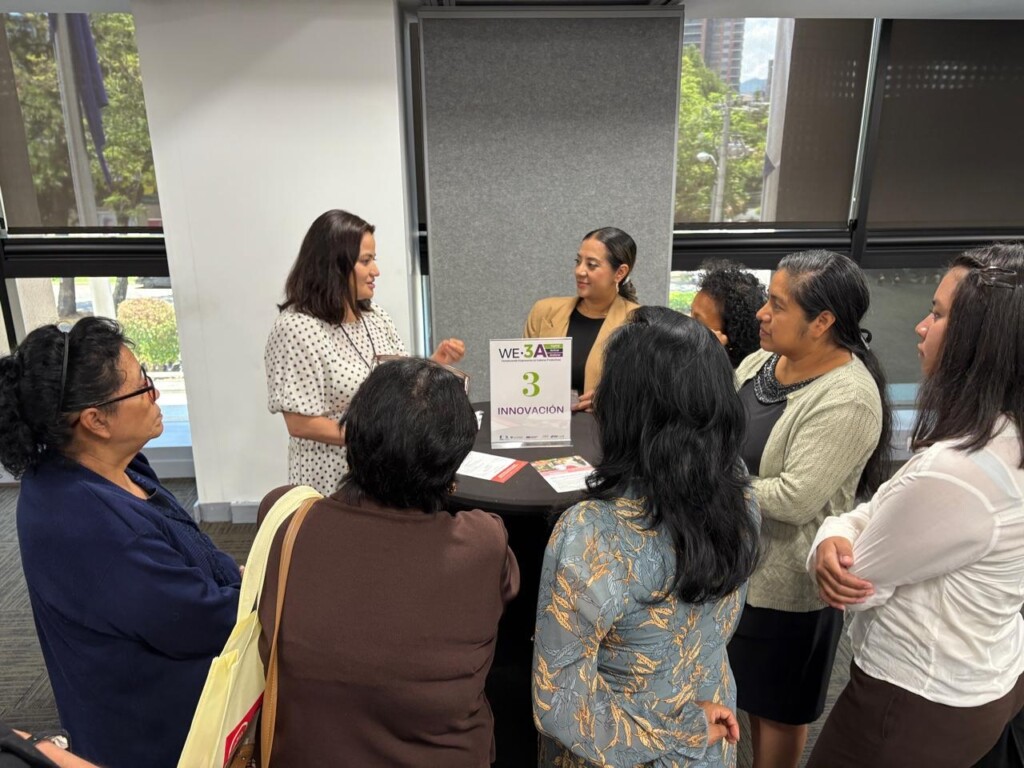
Press release
Success of the WE3A Project: Three Years Strengthening Women’s Entrepreneurship in Guatemala
April 23, 2025Guatemala, April 22, 2025
The project WE3A Strengthening Women Entrepreneurs in Value Chains in Guatemala successfully concludes after three years of business strengthening and empowering women entrepreneurs and business leaders.
After three years of implementation in Guatemala and five other countries in the region, the WE3A project (Aspire, Activate, Accelerate), led by BID Lab and co-financed by WeFi, is coming to an end.
Implemented in collaboration with Thunderbird School of Global Management at the regional level and by CECI Guatemala and Impacto Empresarial nationally, the project aimed to strengthen the business ecosystem and women-led companies, promoting their integration into value chains.
Latin America has one of the highest rates of women's entrepreneurial intent, according to the GEM 2023-24 report. While 80% of women entrepreneurs take this path due to the lack of job opportunities, 60% aim to create a positive impact through their businesses. However, women entrepreneurs face limited access to markets and networks needed for growth. WE3A was designed to address these challenges, along with other barriers such as gender bias, limited available time, and reduced access to training resources.
The Aspire component has been instrumental in showcasing the success of women entrepreneurs through the production and dissemination of real-life entrepreneurial videos (Aspirar Stories Guatemala). The goal was to break conscious and unconscious biases that prevent many women from pursuing or expanding their businesses. These biases are also prevalent in communities, financial institutions, and among potential buyers. Highlighting women’s success helps to reshape perceptions and influence decision-making.
Through the Activate component, over 1,000 women entrepreneurs gained free access to the DreamBuilder training platform, complemented by workshops and personalized mentoring sessions. Training was mainly online and available 24/7, allowing each participant to learn when they had time—an often limited resource. As a result, 40% of the participants completed their training with a solid business plan. The project also developed new content on value chain integration, access to financing, and resilience-building skills. In addition, CECI Guatemala and Impacto Empresarial offered open webinars on key business topics such as digital intelligence, business management, marketing, and leadership (content developed by Thunderbird School of Global Management).
Recognizing the digital gender divide, the project adapted its methods to include women without internet access or computers. CECI Guatemala and Impacto Empresarial formed partnerships with local organizations to provide spaces, facilitators, and close support. A pilot project in Malacatancito, Huehuetenango, successfully trained 13 rural entrepreneurs offline, demonstrating WE3A’s flexibility across different contexts.
Thanks to these efforts, Activate participants created 60 new jobs and 159 reported an increase in sales. Additionally, 19 women entrepreneurs obtained financing or grew their capital.
The Accelerate component targeted established women entrepreneurs through a six-month intensive course focused on business expansion. Participants had opportunities to network with peers from other countries, learn to pitch to large companies and the public sector, and adopt a CEO mindset, learning to delegate and focus on strategy. Among the 34 participants, 50% completed the full program, resulting in notable outcomes: 12 increased their sales and created 63 new jobs, 7 secured financing, and 6 businesses became certified as women-owned by WeConnect International.
The project's impact extends beyond the entrepreneurs themselves. In partnership with WEConnect International, campaigns and workshops were held with buyer companies and the financial sector, promoting gender inclusion in value chains. Four entities committed to implementing internal changes, and 51 companies attended sensitization sessions.
The WE3A project is a clear example of how investing in women’s economic empowerment strengthens the business ecosystem and contributes to sustainable economic growth. When systemic barriers are reduced, women entrepreneurs are ready to grow and enrich markets with their products and services.
Learn more about the project :
In partnership with














